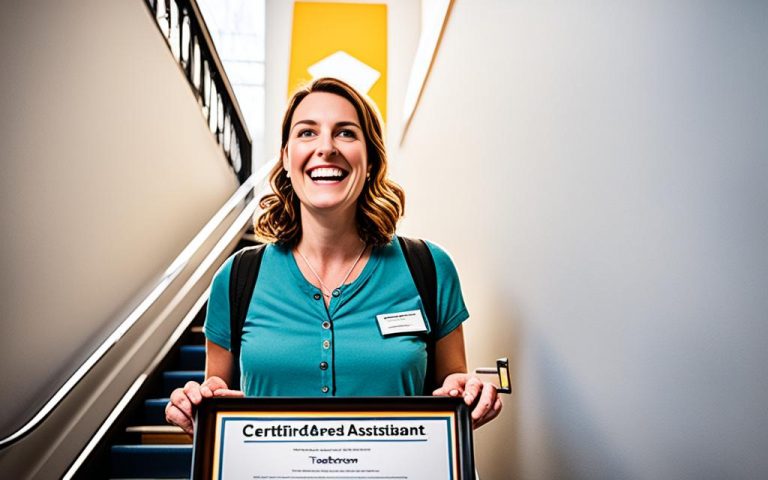Become a Teaching Assistant: Your Guide
Do you want to help shape young minds? Are you thinking about becoming a teaching assistant? If so, you are looking at a career full of new learning experiences. Not just for the students, but for you too. Whether you see this job as a stepping stone or a lifelong career, becoming a teaching assistant is both challenging and rewarding.
In this guide, we’ll explain what being a teaching assistant means. We’ll talk about its benefits. And we’ll show you the steps to get there in a way that’s easy to understand.
Key Takeaways
- Uncover what a teaching assistant role entails and the significance it holds in the educational framework.
- Learn about the personal and professional benefits that come with this impactful position.
- Explore the educational and certification requirements to set your foot in the door.
- Understand the importance of professional development and how it influences your teaching assistant career path.
- Gain insights into the strategies for garnering experience and navigating the education sector as an aspiring teaching assistant.
Understanding the Role of a Teaching Assistant
Becoming a teaching assistant is rewarding and tough. This role plays a key part in helping the classroom and the growth of kids. Knowing what you need to become a teaching assistant is key. Also, keep improving your skills.
Your job as a teaching assistant includes many tasks. You might do administrative work or help students one-on-one. Your goal is to make a place where kids can do well. This means working with small groups, managing materials, and sometimes leading activities with a teacher’s guidance.
- Assisting with classroom management such as setting up equipment or preparing materials for class activities.
- Supporting students with special needs, which requires adaptive strategies tailored to individual learning capacities.
- Facilitating learning through interactive, educational activities and supporting the holistic development of each student.
Being a great communicator is key to doing well. This skill helps you understand and meet the needs of students and teachers. The best teaching assistants are caring, organized, and excited about helping kids learn.
The difference you make as a teaching assistant is huge. You impact not just their grades but also their personal growth. By creating a safe and interesting place to learn, you help kids see what they can do and gain confidence.
Remember, your role as a teaching assistant goes beyond just schoolwork. You’re an important part of your students’ learning journeys. By focusing on growing your skills, you can make an even bigger difference.
The Benefits of Becoming a Teaching Assistant
Have you ever thought about becoming a teaching assistant? It’s more than just a job. It’s a chance to change students’ lives and grow your career in education. Let’s dive into why this path could be life-changing for you.
In this role, you enter an educational space ready to make a difference. You might help with class management or back up learning activities. This support lets teachers focus more on teaching. Thus, students get a better education.
For those wanting to move up in education, teaching assistant how to become one is a key first step. It’s a place to learn from real experience. This experience boosts your career in education.
- Opportunity to influence and mentor students directly
- Gaining practical experience in educational theories and practices
- Potential for flexible working hours suitable for personal scheduling needs
Being a teaching assistant also means job flexibility. Schools often have part-time, full-time, and temp jobs. This can suit your life perfectly, balancing work and personal time.
| Benefit | Description |
|---|---|
| Job Flexibility | Choose from part-time, full-time, or temporary positions. |
| Educational Pathways | Build experience and qualifications toward higher education roles. |
| Student Impact | Directly contribute to the educational and personal growth of students. |
In summary, being a teaching assistant isn’t just about giving. It’s also about what you gain. From growing personally to developing professionally, the benefits are deep and rewarding.
Education Requirements for Teaching Assistant
Starting a career as a teaching assistant means understanding what education you need. We’ll look at the key education requirements for teaching assistants and why they’re important.
High School Diploma or Equivalent
Getting a high school diploma or a GED is the first big step. It shows you have the basic academic skills needed to help in the classroom.
Higher Education Degrees
Higher education isn’t always required, but it helps a lot. Degrees in education, psychology, or related fields make you more knowledgeable and effective.
Formal education is important, but so is practical training for teaching assistants. This training teaches you how to handle classroom materials, help teach lessons, and meet students’ needs.
Meeting these education requirements makes sure you start your teaching assistant career right. You’ll be ready and able to make a difference in schools.
Teaching Assistant Certification Process
Starting on the steps to become a teaching assistant ends with getting the right teaching assistant certification. This certification is key. It proves you can help in classrooms well, meet educational standards, and help students succeed. You’ll find out what you need to know about getting certified here.
The needed education can change based on where you are, the school district, or the students’ ages. Usually, to get certified, you must meet certain educational goals, pass a background check, and go through required training or exams.
Getting your certification is more than just a formality. It’s a big step in boosting your professional standing and grasp of how education works.
So, what does getting certified usually involve?
- Learning about what your state requires
- Finishing any required training or degree programs
- Passing tests on skills or background checks
Check out this table for a better idea of common requirements and ways to get teaching assistant certification:
| Requirement | Description | Examples |
|---|---|---|
| Educational Background | Minimum education needed | Associate’s degree, or two years of college |
| Examinations | What tests are needed | Basic skills test, specific subject tests if needed |
| Background Check | Checks for safety in schools | Fingerprinting and checking criminal history |
| Continuing Education | How to keep certification valid | Professional development every few years |
It’s important to keep up with changes in educational policies and standards. Staying current means your teaching methods will always match what’s new in education.
In the end, working towards teaching assistant certification may seem tough, but it pays off. It prepares you to make a positive impact in education. Best of luck as you start on these steps to become a teaching assistant!
Teaching Assistant Training and Professional Development
Starting your career as a teaching assistant opens many doors for learning and growth. It is crucial to know what qualifications you need and what development programs are out there. This knowledge can help you move forward in your career.
On-the-Job Training Opportunities
Many schools offer hands-on training for teaching assistants. This training lets you learn from experts while dealing with real situations in classrooms. It’s a valuable way to use what you’ve learned in theory, understand students better, and meet their educational needs.
Continuing Education for Career Growth
Continuing education is key to advancing as a teaching assistant. Getting additional certifications or training can boost your skills and qualifications. Workshops, seminars, and conferences can also improve your abilities. Often, your employer might even pay for these.
- Advanced behavioral management courses
- Special needs education techniques
- Literacy and numeracy development strategies
These programs keep you up-to-date with new educational strategies and technology. They make you more valuable as a professional and can help you climb higher in your career.
- Identify areas for skill improvement.
- Seek opportunities that align with personal career goals.
- Engage actively in all training and development sessions offered.
Every step you take on this path boosts your ability to make a difference in education. It leads to a rewarding and ever-changing career as a teaching assistant.
Qualifications for Teaching Assistant
Want to be a teaching assistant? You’ll need to know the basics and more. Getting the job means having the right education and skills. Think of it as a mix of school learning and life skills.
Education and Certification
- High school diploma or equivalent
- College coursework or a degree in education (preferred but not mandatory)
- Certification programs specific to school district requirements
Essential Skills
You must have certain skills to do well in this job:
- Communication skills – you need to speak and listen well to teachers and students.
- Organizational skills – you should keep things in order and plan ahead.
- Patient demeanor – being patient with all students is a must.
- Adaptability – you should be flexible with various teaching methods and classrooms.
Knowing how to use the latest education technology is also a plus. This helps you support teachers and students better.
| Qualification | Details |
|---|---|
| Education | High School Diploma, College Coursework |
| Certification | Varies by region; generally involves coursework and a practical component |
| Key Skills | Communication, Organization, Patience, Adaptability |
| Technological Proficiency | Familiarity with educational software and tools |
If you’re just starting out or switching careers, these qualifications are your first steps. They pave the way to a fulfilling job as a teaching assistant.
Steps to Become a Teaching Assistant
Starting your path as a teaching assistant means following certain steps, from deep research to acing interviews. Here’s a detailed guide to help you smoothly go through this journey.
Researching the Requirements
The initial step is knowing what you need to become a teaching assistant in your area. These requirements vary by district or the age group you plan to work with. You’ll likely need specific educational qualifications, certifications, and maybe even classroom experience.
Preparing Your Application
Your application is crucial for a strong first impression. Make sure to include:
- A detailed resume that shows your education and any relevant experience.
- A cover letter for the specific role you’re applying for, explaining why you’re the right fit.
- Copies of necessary certifications and endorsements.
Ensure your application shows your skills and excitement for teaching assistant training.
Interview Readiness and Techniques
Interviews might seem scary, but proper preparation will help you feel confident and land the job. Keep these tips in mind:
- Learn about common interview questions and think of well-considered answers.
- Do practice interviews with friends or mentors to improve your speaking.
- Show you know the institution’s curriculum and principles.
Being able to communicate well and showing initiative are crucial in interviews.

Understanding the steps to become a teaching assistant helps make your way to a fulfilling education career easier. Each step, from doing your homework to getting ready for your application and interview, is vital in becoming a skilled teaching assistant.
Teaching Assistant Skills Development
To be a great teaching assistant, you need some key skills. These skills help you handle the classroom and boost student learning. We’ll look at important abilities like communication, organization, patience, and being adaptable. These are vital for anyone wanting to become a teaching assistant.
Communication Skills
Good communication is key in schools. As a teaching assistant, you must give clear instructions and feedback. You also need to lead discussions well. Work on your speaking and listening skills. This helps you connect with all students, no matter their background.
Organizational Skills
Being organized is a must for teaching assistants. You’ll handle teaching materials, keep records, and plan activities. These skills keep your classroom in order. Getting better at organizing can make learning more effective and less stressful.
Patience and Adaptability
School life is full of surprises and challenges. You need patience to deal with difficulties calmly. Being adaptable lets you change your approach when needed. These qualities help you manage the constantly changing classroom environment.
| Skill | Description | Impact on Classroom |
|---|---|---|
| Communication | Ability to convey information clearly and effectively | Improves engagement and understanding |
| Organization | Efficient management of resources and schedules | Creates a structured learning environment |
| Patience | Capacity to handle challenges calmly | Enhances the ability to cater to diverse learners |
| Adaptability | Flexibility in handling unforeseen changes | Supports dynamic teaching situations |
Improving these skills makes you a better teaching assistant. It helps you meet teaching assistant qualifications better. By developing these skills, you’ll positively impact education. You’ll help students grow and also move forward in your own career.
How to Gain Experience as a Teaching Assistant
Gaining practical experience is key on your journey to becoming a teaching assistant. You’ll find many real platforms and strategies to build the skills you need. This will positively impact your teaching assistant career path.
- Volunteer: Many schools and educational programs welcome volunteers. This is an excellent way to immerse yourself in an educational setting and understand the responsibilities that come with the role.
- Internships: Secure an internship either through your educational institution or by directly applying to schools. Internships offer a structured way to gain experience while being guided by seasoned professionals.
- Entry-level Positions: Look for job openings for assistant roles that do not require extensive experience. This often serves as a stepping stone into the professional world of education.
- Summer Camps and Workshops: Participating or working in summer camps and workshops designed for children can provide valuable hands-on experience that is beneficial in this career path.
Each of these opportunities not only gives you practical skills but also boosts your resume. This makes you a strong candidate for future teaching assistant roles. Committing to these experiences will greatly advance your career. It shows your dedication and skill in the field of education.
Teaching Assistant How to Become
Want to be a teaching assistant? It’s important to know the job market and how to network. You’ll need to get the right certification and learn where to find job openings. This journey is about more than just the basics.
Navigating the Job Market
Looking for teaching assistant jobs means checking school websites, job boards, and government sites. Knowing the different requirements of schools can make your job search better. It’s key to stay up-to-date.
Networking with Education Professionals
Networking is key for teaching assistants. Talking with education experts can give you important tips and might even help you find a job. Going to seminars, joining groups, and getting social online can help a lot.
Tip: Don’t hesitate to ask for help from teaching assistants or teachers. They can offer great advice and support as you start.
| Platform | Type of Resource | Benefit |
|---|---|---|
| Educational Job Boards | Job Listings | Direct access to numerous teaching assistant vacancies |
| Professional Education Groups | Networking | Opportunity to connect with industry professionals |
| Social Media | Online Networking | Keeps you updated on seminars and educational events |
The Different Types of Teaching Assistant Positions
The world of teaching assistant positions is full of options. It’s designed to meet various educational needs. Special Education Assistants and Subject-Specific Assistants are two key roles. Each one needs certain skills and training. Whether you’re just starting or looking to improve, knowing about these roles is important for your career.
Special Education Assistants
Special Education Assistants help students with different needs. They need lots of patience, empathy, and skill to teach each student in a way that works for them. Their job isn’t just about teaching; they also give emotional and sometimes physical support. This helps students do well in school.
Subject-Specific Assistants
If you’re good at a certain subject, consider being a Subject-Specific Assistant. These assistants team up with teachers to enhance the learning experience. They focus on subjects like maths, science, or languages. Being an expert in the subject and getting students interested are essential.
When choosing a path, think about what you’re good at, your career goals, and what schools need. No matter which path you pick, you’ll make a big difference in schools. Both offer great chances to grow in the teaching assistant field.
Teaching Assistant Career Path Advancement
Exploring the pathway to become a teaching assistant includes understanding the educational needs. It also involves looking at the long-term career growth options in education. Moving up in your career brings more responsibilities and new chances to learn and grow professionally.
To advance, teaching assistants should focus on getting more education and certificates. These steps can boost your position in education. They can lead to becoming a lead teacher or hold administrative roles at schools.
- Further education, including bachelor’s or master’s degrees in education or a specific subject area.
- Specialized training programs that focus on niche areas like special education or bilingual education.
- Professional development courses that enhance skills in classroom management, educational technology, and curriculum development.
Advancing isn’t just about meeting the basic steps or education requirements for teaching assistants. It’s about going beyond and aiming for higher success. Adding to your experience through volunteering or internships in different settings can broaden your view. It can also improve skills that education leaders value.
| Career Milestone | Education/Training Required | Experience |
|---|---|---|
| Lead Teaching Assistant | Advanced diploma in Education Assistance | 3-5 years in various educational settings |
| Special Education Teacher | Bachelor’s in Special Education | Experience with special needs students |
| School Administrator | Master’s degree in Educational Leadership | Minimum 5 years teaching experience |
Improving your education and gaining hands-on experience can make a big difference. They enhance your chances for employment and your ability to make a positive change in schools. See every educational opportunity as a step forward in your career in education.
Preparing for Your First Day as a Teaching Assistant
Starting as a teaching assistant is exciting and challenging. To ease into the role, being prepared is key. You’ll learn how to connect with students, work with teachers, and handle the classroom.
Knowing the classroom and your students’ needs is vital in teaching assistant skills development. We have a simple checklist for your first days:
- Review class rules and student info to make your approach personal.
- Pick out your outfit beforehand. It should follow the school’s dress code and let you move freely.
- Get there early to learn the classroom layout and the tech you’ll use.
Here’s what to expect on day one:
| Time | Activity | Tips |
|---|---|---|
| Morning | Introduction to staff and tour of school facilities | Bring a notebook to write down key info and names. |
| Mid-Morning | Observe classes | Note teaching styles and how students interact. |
| Afternoon | Meet with mentor teacher | Talk about your role, expectations, and classroom management. |
| Late Afternoon | Prepare for the next day | Go over lesson plans and ask the teacher any questions. |
Your success will depend on how well you use your teaching assistant skills development. A good relationship with everyone from the start will help you a lot.
Conclusion
Starting your journey to be a teaching assistant requires hard work. Yet, this guide shows clear steps to reach your educational goals. Focus on getting the right qualifications for teaching assistant. This means getting the right education and adding certifications and experience.
Being a teaching assistant is rewarding. It lets you change students’ lives significantly. Your passion and dedication can bring great joy to your career. As you figure out teaching assistant how to become one, you’ll see your hard work pay off. You’ll enjoy helping students grow and making the classroom a lively place.
Now it’s time to start your journey with courage. Check the requirements and qualifications first. Then, improve your skills for this amazing profession. A rewarding career as a teaching assistant is waiting for you. Each student’s smile and success you contribute to will be worth it. Embrace this challenge and begin shaping your future in education today.
FAQ
What does the role of a teaching assistant entail?
The role of a teaching assistant is quite important. They help with managing the classroom and supporting students during learning activities. They work with teachers to give personalized attention to students. They sometimes do administrative tasks too.
What are the benefits of becoming a teaching assistant?
Being a teaching assistant is rewarding. You deeply influence students’ lives and gain experience in education. The job often has flexible hours. Plus, it opens doors to further career opportunities in education.
What are the education requirements for a teaching assistant?
You usually need a high school diploma to be a teaching assistant. But, higher education in related fields can improve your job chances. Some places might ask for extra certifications or qualifications.
How can I become certified as a teaching assistant?
To get certified, you might have to finish some training programs and pass tests. The process checks your understanding of current education standards. You may also need to keep renewing your certification.
What training and professional development opportunities are available for teaching assistants?
There are many ways to grow as a teaching assistant. On-the-job training, courses, and workshops are some. Peer mentoring is also helpful. It’s important to keep learning to improve and advance your career.
What qualifications are needed to become a teaching assistant?
To be a teaching assistant, you need good soft skills and knowledge in education. Skills like communication, empathy, and working with others are key. You can also benefit from having specific training or certifications.
What are the steps to become a teaching assistant?
First, learn what the job asks for. Then, make sure your application is strong. Developing your interview skills is important. Also, get experience through volunteering, internships, or related work.
How can I develop essential skills as a teaching assistant?
Work on your communication and organization. Be patient and flexible. Always look for chances to learn more and develop professionally.
How do I gain practical experience as a teaching assistant?
You can volunteer at schools or join educational programs. Internships and entry-level jobs also offer great experience. Hands-on experience helps you understand how to best support teaching and learning.
What strategies should I use to navigate the job market as a teaching assistant?
Network and connect with educators. Go to job fairs and check online job sites. Make sure your resume points out your relevant experience and skills. Be proactive in your job search.
What are the different types of teaching assistant positions available?
There are many roles for teaching assistants. Some work with special education students while others help in subjects like math or languages. Positions can also focus on assisting a single student or the whole class.
How can I advance my career as a teaching assistant?
Advancing can mean getting more qualifications or training. Experience counts too. Some teaching assistants go back to school for higher degrees. This can lead to higher positions like a lead assistant, teacher, or administrator.
What should I do to prepare for my first day as a teaching assistant?
Know the school’s routines and what’s expected. Look over the curriculum. Build a good relationship with the lead teacher. Bring any materials you might need. Be ready to learn and stay flexible.







